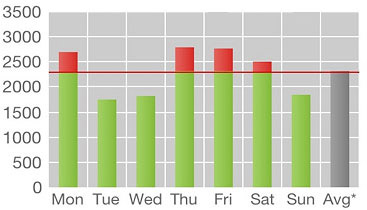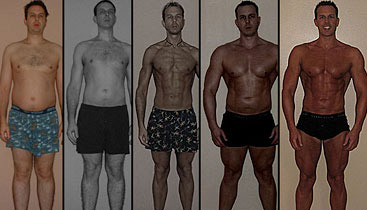BULKING & CUTTING DIET ON REST DAYS (LESS CALORIES ON NON WORKOUT DAYS?)

“Should I eat less calories on rest days vs. workout days?”
This is a question I receive on a surprisingly frequent basis, and I figured it was time to make a specific post addressing it.
The idea of consuming more calories on workout days and less calories on rest days would seem to make sense on the surface…
After all, your body requires a greater amount of energy on workout days in order to fuel your training sessions as well as to recover from them, and conversely, it requires less energy on non-workout days since you’ll be less active overall.
For that reason, some people will opt to “cycle” their nutritional approach by following a higher calorie diet on training days and a lower calorie diet on rest days.

This is done under the assumption that structuring calorie intake in accordance with energy needs will increase workout quality, improve recovery, and decrease excess fat gain in the long run.
The problem with cycling your calories on a day to day basis like this is that it is an incredibly short-sighted view of muscle building and fat burning nutrition.
Whether your goal is to bulk up and put on muscle or to lean down and lose body fat, you need to keep in mind that these are both very slow, gradual processes that are determined by the actions you take over the long term.

Your total net results in either direction are not going to be measurably affected by a few hundred calories more or a few hundred calories less within small blocks of 24 hours.
People tend to categorize things in terms of individual days (for example, a “good” day of eating or a “bad” day of eating) simply because that’s the primary way that we organize our time.
However, within the context of an overall muscle building or fat burning program, 24 hours is really quite an insignificant period of time.
In addition, muscle growth and fat loss are not “on/off” switches. It’s not as if you’re “building muscle” one day and then “maintaining muscle” the next, or “burning fat” one day and then “maintaining” the next.
Rather, your body is in a constant state of both muscle growth and muscle breakdown, as well as a constant state of fat burning and fat storage. It’s the total sum of all of these processes over the long term that will determine your bottom line body composition.
For these reasons, worrying about cycling your diet by eating more calories on workout days and less calories on rest days is really just a waste of effort and does nothing more than over-complicate your diet without improving your results.
Not only is expending your energy on unnecessary strategies like this a bad thing in and of itself, but it may also negatively affect you over the long term for the simple reason that it will make your diet plan harder to follow.
Constantly raising and lowering your calories from day to day is obviously more difficult and tedious to track than simply maintaining a steady intake from day to day, and the simple fact is that the more complex your nutritional approach is, the less likely you’ll be to stick to it over the long haul.

Your goal when structuring your muscle building or fat burning diet should be to only make it as complicated as it absolutely needs to be, and to eliminate the inessentials. That way you can place all of your focus on the things that truly matter, and get the maximum benefits while utilizing your time and energy in the most efficient way.
Now, that doesn’t mean there’s anything wrong with eating less calories on rest days vs. workout days, and if you truly prefer that method because it fits better into your natural hunger patterns or schedule, that’s totally fine.
The take-home point here is that it just isn’t going to make a noticeable difference either way, and if maintaining a consistent calorie intake from day to day is the easiest method for you to follow, then that’s definitely the route I’d recommend you go.
If you found this article helpful, make sure to sign up for your FREE custom fitness plan below...




